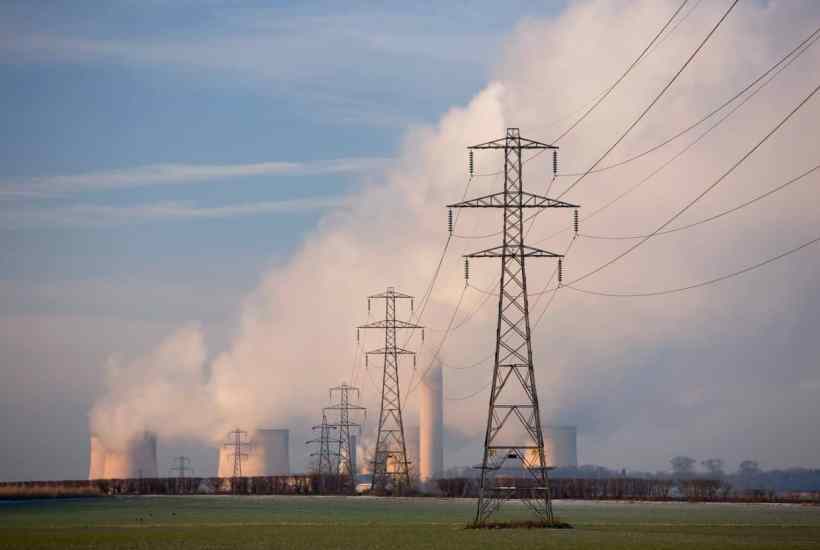We are living through an energy crisis unlike anything since the oil shocks of 1973 and 1979. The average household energy bill is set to reach over £3,500 a year. Businesses are already going bankrupt as they face ruinous costs. And inflation, driven in part by high energy prices, is expected to hit 10 per cent with the threat of more drastic price increases in the new year.
In these circumstances, it is surprising that no leading politician has yet made the case for nationalisation of our energy sector – even though new polling shows half of Tory voters believe energy should be brought back into public ownership. Some have made the argument that nationalisation will bring down energy costs – this may not be the case. Regardless of who owns our energy assets, they will have to buy natural gas at wholesale prices dictated by market conditions. But we are now facing a volatile world. And to ensure our energy security, nationalisation may be the best option we have.
At the moment the proposed solutions to the energy crisis put forward by politicians – such as a cap on energy prices or universal or targeted payments to households – will protect some people from ruin, but they underestimate the scale of the challenge. For starters, fixing or subsidising the price of energy may make shortages worse if households don’t cut back on their energy use, which could even lead to blackouts.
But the market won’t solve the problem on its own either. In an ideal world, a period of sustained high energy prices would lead to a demand-side response as households cut their energy and heating use, begin to give up non-essential expenses, and homeowners and landlords install heat pumps, new windows and so on while some sort of targeted support scheme is introduced. We do not live in that world.
Retailers are already beginning to refuse to provide energy to small businesses they’re convinced will go bankrupt as the current energy crisis and other factors drive the economy into a painful recession. Efforts to encourage heat pump installations have fallen flat because of the relative timidity of the spending incentives sponsored by the government. Any anyone trying to install renewable energy and battery capacity for their home or business depends on imports from China and Germany, both of which are now struggling with energy shortages and reduced production – and even closing plants temporarily because costs are too high.
There is no conceivable way that prices on the market can effectively marshal a private response to the energy crisis because of the constraints on supplies and the degree to which skyrocketing prices impact the wider economy. Faced with these costs, small businesses will go bankrupt and countless people who normally go out to drink, eat, or shop will reduce their spending, driving yet more businesses under.
Another option, bailing out businesses at the expense of households, would be yet another brake on growth and take money out of the hands of those who need it most as the economy eventually sputters back to growth.
By contrast, nationalisation would solve several of the country’s problems. It would allow the government to go beyond setting a price level at market rates and accept payments from households and businesses directly, with energy company shareholders no longer put ahead of households. The recent increase in the price cap ought to be reversed, with the state holding prices at the previous cap and providing relief. This may encourage more consumption and risk shortages, but the alternative is to ration power using prices. Doing so risks driving huge swathes of manufacturers, hospitality businesses, and more into bankruptcy.
It would also allow the state to take on the financial risks of building and maintaining excess storage capacity for natural gas and directly coordinating the deployment of new renewable energy and, eventually, nuclear power with battery storage.
The energy crisis has shown the weakness of our current privatised model. Before this year, the UK only maintained enough natural gas storage capacity to meet five days’ demand. Because of this lack of storage we are currently sending excess natural gas back to the continent, which we will then be reliant on through the winter. A nationalised sector could and should aim to mitigate these weaknesses in the future, improving the resilience of the energy sector without forcing privately held firms to take on excessive risk.
In no way does nationalisation signal the abandonment of market pricing or mechanisms. Instead, it aims to resolve the impasse of who maintains storage and redundant power generation, which is necessary as renewables’ share of generation rises. And it eliminates the existing incentives to return money to shareholders rather than reinvesting into the grid. Many of these aims can be achieved through a combination of regulation and subsidies, but this raises an important question: why should the state take on the energy sector’s losses while letting private firms enjoy the gains?
Marrying the state’s existing authority to impose a price ceiling with the capacity to invest in future would give us more stability over the next five years. At the moment we have the worst of both worlds, with the state forced to develop increasingly complicated regulatory mechanisms to ensure that private companies facing their own considerable constraints build up energy reserves.
The stakes could not be higher – now and in the future. Natural gas is not just used by households but for a wide range of goods. Fertiliser plants shut down when prices rise too much, threatening food security. The closure of CF Fertiliser’s ammonia plant at Billingham last September made clear the risks of price volatility affecting strategic industries. Thousands of businesses in hospitality, a sector that employs over 3 million people, will not be able to afford heating. Natural gas also feeds into input costs for metallurgical firms, food and beverage makers, automotive manufacture, and more. High bills increase costs, compounding the risks of greater unemployment in the event of a recession. A nationalised energy sector would allow the state to build up reserves that could be used for intermittent injections into the grid at rates not deemed ruinous to socially and strategically crucial industries. Just as importantly, it allows the state to contain the spillover effects of spikes in natural gas prices or declines in power generation in neighbouring economies, and therefore smooth out the effects of external shocks to energy markets.
Then there is the UK’s need to decarbonise and diversify our energy supply. Developing the capacity to build enough batteries, solar panels, or heat pumps will be best managed by the state, which will not be hampered by fragile supply chains. Effectively coordinated investments in storage, reductions in natural gas consumption through heat pumps, insulation, and efficiency improvements and longer-term investments in nuclear power can unlock private capital. By providing more certainty about future supply, price stability, and reduced emissions levels, the business case for new manufacturing plants and other energy-intensive projects such as hydrogen production improves.
Arguments about the cost of nationalisation are a red herring. Already interventions focused on providing relief for consumers or subsidies to industries will be astronomically expensive without doing anything to address supply or disruptions. How are firms supposed to plan tenders for new windfarms, solar panels, and so on if there’s a decent chance demand will fall from business bankruptcies? Labour’s plan costs £29 billion, the Liberal Democrats proposal costs £39 billion, and we’ve seen leaked ideas from the Conservatives which include a whopping £100 billion bailout scheme for industries. Any calculation about cost must contend with the cost of doing nothing or too little, condemning the economy to a surge in unemployment, falling investment, increased strain on social services, and yet lower tax revenues as spending and standards of living fall.
The degree to which today’s energy crisis will drive huge swathes of the public into poverty and weigh on the country’s growth prospects cannot be understated. Nationalisation is not a move towards central planning. It is a means to save the market from itself in the face of systemic shocks that will last far beyond this winter.
Got something to add? Join the discussion and comment below.
Get 10 issues for just $10
Subscribe to The Spectator Australia today for the next 10 magazine issues, plus full online access, for just $10.




















Comments
Don't miss out
Join the conversation with other Spectator Australia readers. Subscribe to leave a comment.
SUBSCRIBEAlready a subscriber? Log in